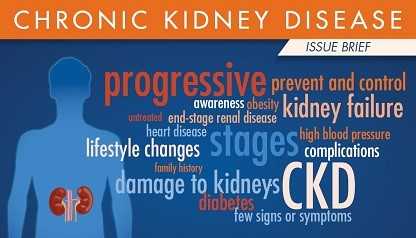Chronic Kidney Disease Issue Brief
What Is Chronic Kidney Disease?
Fast Facts
- Kidney diseases are the 9th leading cause of death in the United States.
- CDC estimates that more than 20 million US adults aged 20 years or older have CKD—or more than 10% of the US adult population.
- Every 24 hours, more than 300 people begin treatment for kidney failure.
- CKD is costly. Treating Medicare patients aged 65 or older with this disease cost the United States $44.6 billion in 2012.
Chronic kidney disease (CKD) is a condition in which a person has damaged kidneys or reduced kidney function for more than 3 months. During this time, the kidneys cannot properly filter waste out of the blood. If not detected and treated early, CKD can cause many health problems and even lead to kidney failure and early death. Preventing CKD and its complications is possible by managing risk factors and treating the disease to slow its progression and reduce the risk of complications. Read more…
- Page last reviewed: July 14, 2015
- Page last updated: July 20, 2015
- Content source:
- Maintained By:
- National Center for Chronic Disease Prevention and Health Promotion, Division of Diabetes Translation


 ShareCompartir
ShareCompartir
